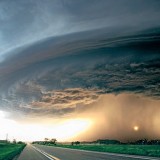The kaleidoscope turns, the patterns change, but the colours remain mostly dark and sombre. This year, last year, and the years before are sobering because the dramatic changes in awareness, policy and mechanisms we need to address our major environmental challenges do not match the urgency they require.
Everyone who is informed on environmental matters is justifiably subdued because our corrective actions are not even slowing the erosion of the fundamental ecosystems that provide us with our essential comfort and security. Some individual and local efforts have been heroic. Some European countries have met or exceeded their Kyoto Protocol greenhouse gas reduction targets. But the record for the collective human community has been dismal. Most measures indicate deteriorating ecological conditions. Science confirms that our multiple environmental problems are escalating from serious to crisis.
The ethical reflex of those who are concerned about these environmental threats is to go where the problem is, to assume a critical position and highlight shortcomings for correction and future avoidance. This is not only a journalistic inclination but a moral imperative. If we are to confront our behaviour and its consequences realistically then we must examine ourselves with a blunt and painful honestly. We can applaud our successes – and we have many of them – but they mostly measure small against the enormity of the challenges we face. Changing to more energy efficient lights bulbs, building biking routes or buying a fuel efficient car may make us feel better but they are corrective actions that barely register against the magnitude of the changes we must accomplish. Complacence and an exaggerated sense of accomplishment is dangerous self-deception. As for solutions in progress, they no longer need attention because they are now effecting their benefits. The big worries are the big problems. And 2011 addressed them poorly.
The United Nations’ December climate talks in Durban were mostly unsuccessful, a formal exercise in futility that succeeded only by rescuing delay from the jaws of total failure. If climatologists are correct, we don’t have another eight years of grace to negotiate and implement an international agreement on greenhouse gas emissions. This strategy is so fraught with procrastination, pitfalls and vague commitments that – if precedent is any indication – either nothing will happen in 2020 or binding reductions will happen too late to avoid serious climate change.
A recent study by the Organization for Economic Co-operation and Development (OECD), for example, compares the economic damage in 2050 by two strategies: by either making low-cost reductions in greenhouse gases immediately or by delaying major reductions until 2020. The worldwide impact on “real income” for the first option was minus-6 percent and minus-9 percent for the second option. According to the OECD projections, Canada would fare worse than the world average with both options: minus-12 percent for immediate reductions versus minus-15 percent for delayed reductions (Globe & Mail, Nov. 28/11).
And this is just the impact on “real income”. The UN has estimated that by 2030, the economic damage from climate change alone will be about $100 billion annually, a figure that counts only added health expenses, farming adaptation and infrastructure repairs. A broader assessment of costs, considering flooding, storms, manufacturing impacts and ecosystem restoration at least triples that annual amount to $300 billion. And even this amount may be too low because the UN’s worst-case scenarios for carbon dioxide emissions are regularly exceeded. In 2011 alone, the United States had a total of $52 billion in damages from a record of 12 major weather events (Ibid., Dec. 9/11). Statistically, 75 percent of all natural disasters are now climate related. The obvious conclusion to be reached from this trend is that greenhouse gases have incontrovertible adverse effects on weather and, from a purely economic perspective, we would find it cheaper to cut emissions now rather than later.
But that’s just climate change. We have other critical issues that need immediate attention. Species extinction is in freefall. The world’s industrial fishing fleets are exhausting the oceans of fish, the source of protein for one-fifth of humanity. Why is no emergency action being taken to create protective marine reserves? Acidification, dead zones and pollution beleaguer our oceans, problems that need immediate action. Canada, instead of subverting action on climate change and muzzling scientific dialogue, could be leading the world community toward sustainable uses of our oceans and resources. It could be spearheading a universal carbon tax on all CO2 production, a levy that could be directed toward preventative measures such as energy research, mass transit and ecological protection. (Both BC and Australia have a variation of this tax.) Instead of subsidizing the fossil fuel industry and encouraging Alberta’s dirty tar sands, Canada could be financing geothermal energy, a massive source of clean and renewable power that could meet our nation’s entire electrical needs with as few as 100 projects (Times-Colonist, Sept. 14/11).
So a review of 2011 provides the sobering realization that the world community – and Canada in particular – is moving backwards rather than forwards on key environmental issues. Circumstances are getting worse rather than better. We are not rising to meet our environmental challenges. If we were at least moving in a positive direction perhaps some optimism would be warranted. Criticism and negativity are prevalent because humanity – and particularly Canada – is failing the most important test in our history as a species. Cynicism is rising measurably. Political leaders seem to lack the insight, will or ability to take the necessary remedial action. And voters seem to lack the perspective, conviction or resolve to direct them to do what is increasingly imperative.
If this changes, then the colours in the kaleidoscope will brighten. Maybe 2012 will be a better year.





